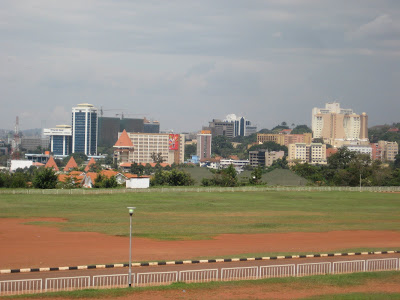The last few days have felt pretty helter-skelter with meetings and brainstorming research projects. Things move at a different pace here, and because the professors are quite busy, our meetings often get rescheduled (i.e. moved back a few hours). However, when we do sit down and talk, everyone has been very supportive and has given us all the time we need. This combination makes days feel quite busy despite the fact that we may only have a few appointments.
I'm still figuring out what I'm going to work on this year, and at each meeting I've been explaining that "My interests are pretty broad, and my experience is varied, but I want to work on a project that is locally relevant and has the support of faculty and institutions here, so that when I leave the work is useful and can continue if necessary." Of course, I don't want to work on something that I'm not passionate about, nor do I want to jump off the deep end into something that will take a lot of time for me to become proficient (i.e. lab work). On the other hand, the whole point of this year is to stretch myself, gain skills I don't have, learn about topics with which I'm unfamiliar, and ultimately with the help of others, explore research questions that no one knows much about. Being too careful is as big a risk as being too cavalier.
Several faculty members gave me some ideas about projects, but I got the sense that they probably wouldn't have a lot of time to continue working with me. I've saved those suggestions to think about more later this year. One topic that seems to generate a lot of interest is HIV/AIDS in the older adult population in Africa. I was initially exposed to this idea by one of my mentors at Michigan (Hi Dr. Malani!), but was unsure about whether to push forward on it without some support from others around here. Yesterday, I had a great set of discussions with Aggrey and professor Mayanja-Kizza at Makerere, which got me excited about moving forward in that vein. I'm going to try to do some reading this weekend to get caught up on what is known and what isn't so I can start to think through research projects that we can do at JCRC and IDI.
In other work-related news, on Tuesday I sat in on the JCRC equivalent of grand rounds and went on ward rounds with one of the staff physicians. I love seeing patients and thinking through clinical dilemmas, and I forgot how much I missed it until I was back in the thick of things. I have a lot to learn about taking care of people living with HIV/AIDS, TB patients, etc. The docs are really welcoming and have a lot of experience, so I think this is going to be an awesome opportunity to learn from experts in the field.
In terms of personal life, I'm still living at the Case Western house, but will be moving out in the next couple of days. I'm either going to move into Brandon's living room at his hotel, or to a hotel near Makerere. The IDI has a really nice apartment near Mulago, but it's a bit more expensive than I was expecting to pay (but still well within reason and my budget). I might look at a couple of places this weekend with some brokers, but my gut tells me I'm probably going to end up at the IDI apartment. A nice roommate, washing machine, good security, and garden aren't easy to turn down.
Sorry about the few photos. I've been around most of these places before and will be here all year, so I rarely have an urge to pull out my camera.
Random Notes:
- Brandon found metered taxis in Kampala, which sounds awesome.
- Ate at Hanndi twice this week. Beautiful.
- There was a special about cross-cultural relations in Dearborn, MI on Al Jazeera earlier this week.
 |
| View of City Center (Nakasero) from Kololo |
i can totally relate to a lot of what you said. keep up the good work!
ReplyDeleteA washing machine?? Don't lose touch with the village life... when will you be out to visit us in Iganga?
ReplyDeleteHoping to make it to Iganga soon!
ReplyDeleteGlad to see you are settling in there...
ReplyDeleteHave you considered doing any human health-environment studies? How big of an issue is malaria in Uganda? what about Sleeping Sickness?
Both of these diseases have connections with human induced land change. With malaria, the "forest edge" (made from clearing forests) communities make ideal habitats for mosquito vectors and subsequently you see a higher infection rate (this has been documented). There are other factors here too, and the sleeping sickness is a bit more complex situation. But I can fill you in on some details about them if you're interested...